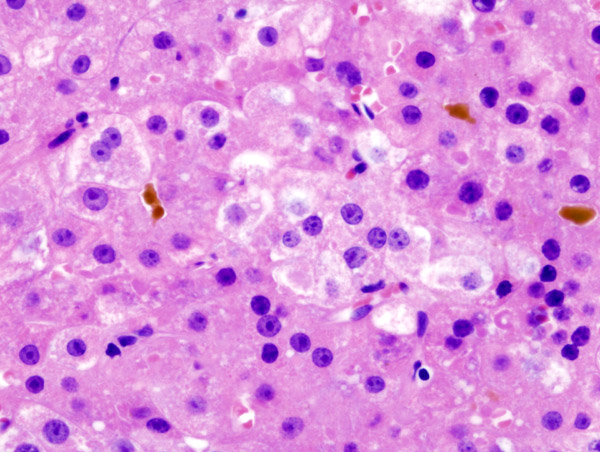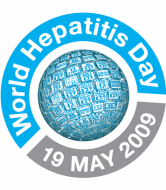World Hepatitis Day
Interview with
Chris Smith - Now it might surprise you to know that around the world about one person in every 12 is actually living with a chronic infection of their liver, usually hepatitis C or hepatitis B, and those numbers totally overwhelm the numbers of people with pandemics that we are well acquainted with, things like HIV and flu. Not many people actually know about the massive disease burden that's caused by these infectious causes of hepatitis and so to try and remedy this on the 19th May what has been set up is being called World Hepatitis Day and all over the world people will be gathering to try and run events to raise awareness of this. At the University of Birmingham researchers including Dr. Joe Grove will be doing just that and he is with us now to explain a bit about what they are trying to achieve. Hello Joe.
Joe Grove - Hi Chris.
 Chris Smith - Welcome to the Naked Scientists. So tell us what you are actually hoping to achieve with the World Hepatitis Day.
Chris Smith - Welcome to the Naked Scientists. So tell us what you are actually hoping to achieve with the World Hepatitis Day.
Joe Grove - Okay, so like you said World Hepatitis Day would be a lot like World AIDS Day, to raise national awareness of the problem and we are holding an event to highlight the interesting scientific and clinical work that's done here in Birmingham. The aim of the event is to raise awareness with the public and hopefully reach out to people to get tested. Also to engage with the patient community that's in the U.K. and to highlight the important work that's done at the University.
Chris Smith - What will you be doing during the day to tell people a bit about hepatitis B and hepatitis C?
Joe Grove - So we have a couple of MPs, Dr Lynn Jones who is our local constituency MP and Dr Brian Iddon who is a member of All-Party Hepatology Groups. They decide liver policy in parliament. They will be coming down. Also representatives from the local press and the local community and the patient community. We will be giving them a series of talks to outline the scientific research we do here on hepatitis C specifically but also the work that's done to treat both hepatitis B and C in Birmingham and the clinical research such as clinical trials that are carried out here. And then we will be giving them a tour of the laboratories and also the clinical research facility in the hospital.
 Chris Smith - So let's just look at the actual disease that these agents cause and why you need to raise awareness about them. What are hepatitis B and C and why are they a problem?
Chris Smith - So let's just look at the actual disease that these agents cause and why you need to raise awareness about them. What are hepatitis B and C and why are they a problem?
Joe Grove - Hepatitis simply means an inflammation of the liver and if you had acute hepatitis, that is a short hepatitis, that's not necessarily a problem. Viruses like hepatitis A or E cause acute hepatitis that self-resolve. Hepatitis B and C are capable of establishing a persistent infection. So individuals may be infected for the duration of their life. Now this becomes a particular problem because if you have hepatitis over this extended period of time you will start to get other symptoms such as liver cirrhosis and possibly even liver cancer. In the case of hepatitis C there are up to 500,000 people in the U.K. with an infection but 80% of those do not know about it.
Chris Smith - So that makes it a major issue because if they don't know it they can pass it on because these are of course blood-borne viruses. You spread them by sharing blood, sharing needles, having sex with people. So people, if they don't know they've got it can pass them on. So I guess raising awareness about them in the general population is very important because that encourages people to get tested.
Joe Grove - Yes, of course and also there are actually treatments. It is possible to treat hepatitis C and you have a reasonably good outcome of treatment. We have around 50% of patients resolving. However, people often don't seek medical attention until the disease has become particularly apparent and by which stage it is harder to treat. So if there is anyone out there who are worried that they may have been exposed, they should get tested and then they got a much better chance of getting a resolution to the illness.
 Chris Smith - Thank you very much Joe. That was Dr. Joe Grove who is a researcher at Birmingham University and he is hosting what will be Birmingham's contribution to World Hepatitis Day on Tuesday - the 19th May 2009. Their events are actually on Monday 18th, so that's tomorrow. So thank you very much Joe Grove for joining us on this week's Naked Scientists.
Chris Smith - Thank you very much Joe. That was Dr. Joe Grove who is a researcher at Birmingham University and he is hosting what will be Birmingham's contribution to World Hepatitis Day on Tuesday - the 19th May 2009. Their events are actually on Monday 18th, so that's tomorrow. So thank you very much Joe Grove for joining us on this week's Naked Scientists.










Comments
Add a comment